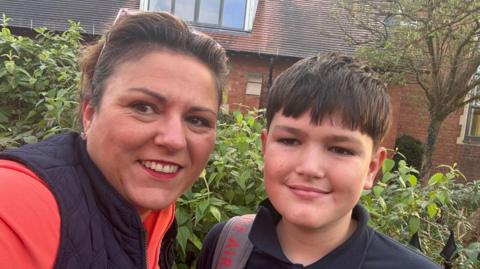Jo’s 10-year-old son Jacob was suspended from his primary school several times, before recently getting permanently excluded for persistent disruptive behaviour. Jacob has an education, health and care plan (EHCP) after an ADHD diagnosis, and is awaiting an autism assessment.
Persistent disruptive behaviour is the most common reason given to suspend or exclude a pupil. But in primary schools, nearly 90% of those permanently excluded over the past five years also had special educational needs and disabilities (Send).
Jo says her son is a “very caring boy” who loves rugby and gaming, but his sensory issues meant he struggled to cope with larger class sizes.
His mum says she lived with constant anxiety about when the phone would next ring because of another incident at school.
Jacob’s school had put in place one-to-one support and access to a speech and language therapist, but Jo says there was no suitable space at the school for her son to decompress.
